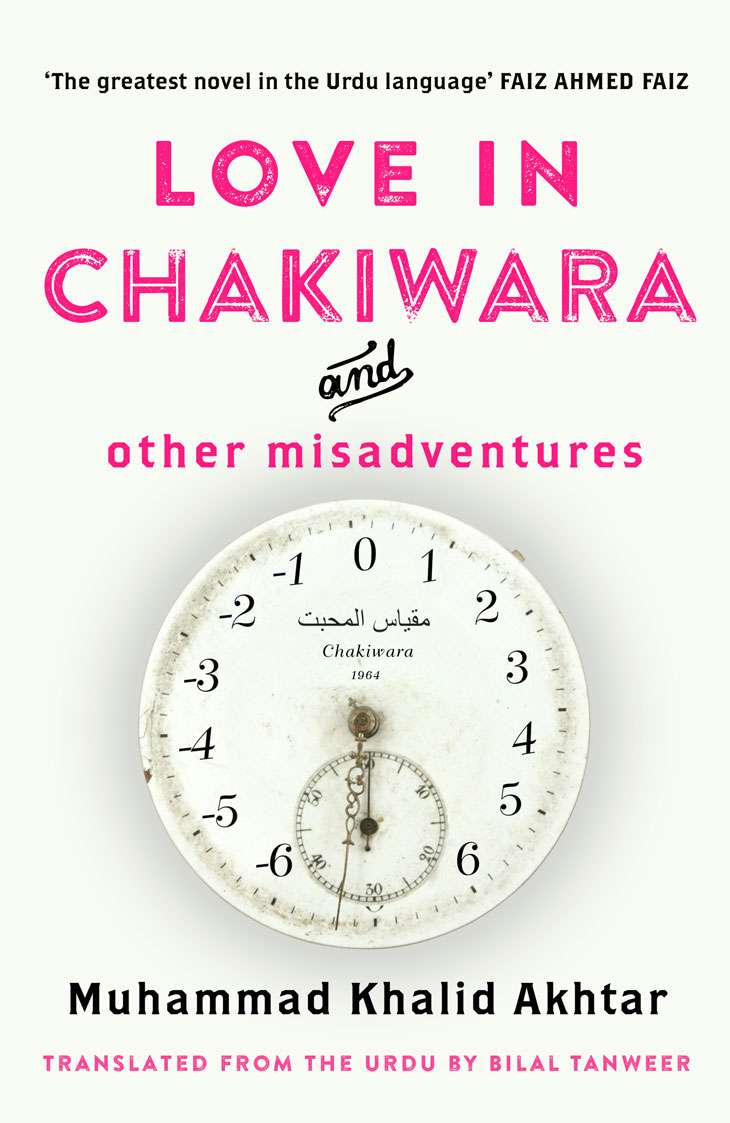Heard of the love meter? You will in Khalid Akhtar's 'Love in Chakiwara'

Faiz Ahmed Faiz, one of the most celebrated writers of the Urdu language, considered Muhammad Khalid Akhtar's Love in Chakiwara and Other Misadventures - "the greatest novel in the Urdu language".
Its greatness will now not be lost on subsequent generations that think and speak in English thanks to Pakistani writer Bilal Tanweer.
Tanweer, whose debut novel The Scatter Here is Too Great won and got shortlisted for prestigious prizes, has done readers a grand favour by translating Akhtar's genius into English.
For someone who first read Tanweer in Granta Magazine, I wondered if Tanweer had schooled himself to learn Urdu as an afterthought. No, I was wrong. Much like Musharraf Ali Farooqi, Pakistani writer-translator who can write beautiful prose in Urdu and English across genres with equal ease, and who encouraged Tanweer to read Akhtar, Tanweer grew up on a healthy of dose of English and Urdu literature.
Khalid wrote Chakiwara mein Visaal in 1964. Over half a century later, it is difficult to keep a straight face while reading it.
The book is set around a small Karachi neighbourhood called Chakiwara, and the chronicler of the daily drama is Iqbal Hussain Changezi, a "bakery owner and collector of writers and geniuses". Changezi fears that no one will touch his own writing - 7,000 pages at last count - with a bargepole, but that does not stop him from feeding his habit of writing.
In "The Smiling Buddha" Changezi has "his eyes on out-of-work comedian Chakori". Changezi's early morning visitor is Qurban Ali Kattar, a young writer, who apparently is suffering from a toothache but thinks the pain has been triggered by the recent nuclear tests which have made him "radioactive".
The visit to the local dentist - a Chinese called Ah Fung - helps. But the doctor recommends removal of all teeth of the "young gentleman". The writer is heartbroken but his friends cheer him up saying his new dentures will make him look "years younger and that half of Chakiwara's female populace would be in his pursuit wherever he went".

The Love Meter
In another favourite story of mine, the inventor of "The Love Meter" Dr Ghareeb Muhammad has drowned himself in the Lyari river.
The doctor was excited about inventing the love meter and had told his friends that his invention will wreak havoc in the world.
"Compared to it, all earlier inventions - the radio, the atom bomb, et cetera - will look like toys. When this invention makes its entry, all the theories of German psychologists will look ridiculous, and the coming generations will refer to the time before Dr Ghareeb Muhammad as the Dark Ages of Humanity".
This was a secret closest to his heart, but his friend had now found him fiddling with the love meter, although all he had really walked into the doctor's clinic for was to borrow Rs 5. The doctor reveals that the invention is ready but for "the flesh heart of a mountain bat" - the most important part of the love meter still missing.
The love meter is easy to read, he tells his friend. Wear it like a watch on the wrist and spot a beautiful woman on the street. If the hand moves towards the right - she likes you, if the hand moves half way down she may be willing to marry you. However, if the hand moves anti-clockwise, the woman is not interested, and if the hand goes further up it is likely that the woman's brothers are going to beat you up.
Of course, he experimented the meter on other animate objects too. Such as "two donkeys". Result: "+6 (probably +3 per donkey)".
Tanweer has done an excellent job of translating Akhtar's genius - but for a couple of editorial errors that need to be rectified (such as Page 72), in the next print orders.
Tanweer talks to Catch about the book and the hurdles in translating works.

Edited excerpts:
LH: Did you grow up reading Urdu literature or is this interest more recent?
BT: Urdu literature was my main source of sustenance until I was twelve or so.
LH: You are an author and also translator? What role do you find more challenging?
BT: Certainly that of a writer. Translation is a creative enterprise but the challenge is rendering a language resonantly in another. It is imaginative and often gruelling work. But in writing, your attention is divided between several things, and language is just one of them. Writing is much, much more demanding.
LH: How difficult was it to translate Khalid's genius? How long did it take?
BT: Actually, Muhammad Khalid Akhtar is one of the relatively easier ones to translate. The reason is to do with his diction. He was a big reader of English works, and he mentioned that he writes in Urdu as if he were writing in English. He mentions Wodehouse and RL Stevenson as inspirations for 'Love in Chakiwara'. The challenge in this kind of translation is getting the humour over and across the language barrier.
LH: Khalid has been described as the finest writer of humour. Who according to you comes a close second?
BT: I do not think writers (or humourists) can be ranked. There are many great humourists in Urdu. One of the living greats is Mushtaq Ahmad Yusufi. Another is Shafiqur Rahman. And of course, many others.
LH: Can we see a book by you in Urdu? Or that is not a medium you think in?
BT: I am mired in a novel that I am writing in English at the moment, so cannot say if that would be anytime soon. But my writing process is aided by Urdu, and there are many sections of my stories that I write first in Urdu before reworking them into English.
First published: 11 January 2017, 16:29 IST






![BJP's Kapil Mishra recreates Shankar Mahadevan’s ‘Breathless’ song to highlight Delhi pollution [WATCH] BJP's Kapil Mishra recreates Shankar Mahadevan’s ‘Breathless’ song to highlight Delhi pollution [WATCH]](https://images.catchnews.com/upload/2022/11/03/kapil-mishra_240884_300x172.png)

![Anupam Kher shares pictures of his toned body on 67th birthday [MUST SEE] Anupam Kher shares pictures of his toned body on 67th birthday [MUST SEE]](https://images.catchnews.com/upload/2022/03/07/Anupam_kher_231145_300x172.jpg)


_in_Assams_Dibrugarh_(Photo_257977_1600x1200.jpg)



